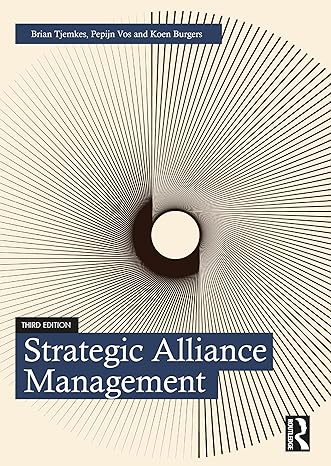TNO is a Dutch-based knowledge organization that applies scientifc knowledge to strengthen the innovative power of industry
Question:
TNO is a Dutch-based knowledge organization that applies scientifc knowledge to strengthen the innovative power of industry and government, which it does by assisting in the various stages of product development, from idea generation to implementation and testing. Hoogendoorn is an expert in glasshouse horticulture, and its computers and software have controlled a wide range of climatic conditions for more than 40 years. Hoogendoorn markets its horticultural computers across the world through a global network that is constantly kept up to date with new and innovative product developments. In 2005, TNO and a business unit of Hoogendoorn called Growth Management started to collaborate on a new innovative product: Sensiplant.
Hoogendoorn and TNO signed a letter of intent in July 2005, and expressed their intention to proceed with the product development roadmap, to the point that an agreement between the two parties would be set for further commercialization of the Sensiplant project.
Sensiplant is an information system based on wireless technology that measures the soil humidity of pot plants. Sensiplant’s self-organizing wireless network makes the system unique, and the communication of the system is based on a self-organizing protocol patented by TNO. Hoogendoorn is responsible for the provision of the required hardware, as well as the sales, marketing and distribution of the product.
Between 2005 and 2007, TNO developed the technology further, and in 2007, the alliance to commercialize the technology became formally effective. A core part of the alliance agreement pertained to TNO licensing its proprietary technology to Hoogendoorn. Some issues however emerged straight away. TNO demanded that Hoogendoorn paid an annual fee, even if sales were below expectations. Although the request was met with resistance, Hoogendoorn complied after extensive negotiations. The development of Sensiplant also had its challenges. Although the hardware seemed to work, the software contained several bugs, which were caused by changes in the initial hardware conditions. To resolve these adversities, a third party, MUCO, was approached. The addition of MUCO to the alliance fxed the hardware and software issues, but also complicated alliance management, as TNO alliance managers perceived that the other two partners were working against it. In addition, tension developed between TNO and Hoogendoorn as the latter decided unilaterally to postpone the release of version 1.0, following initial tests that revealed customers were dissatisfed with Sensiplant’s technical performance.
Despite the setbacks, in 2008, version 1.1 of Sensiplant was fully operational, and Hoogendoorn was ready to launch it on the market. The release of the 1.1 version again created conficts, as Hoogendoorn launched the product internationally, despite contractual clauses stipulating that the Dutch market would be approached frst. In addition, the alliance came under pressure as customers provided serious negative feedback about the product. Complaints about cabling, hardware and software reached the partners. However, TNO decided to resolve these issues harmoniously and assist Hoogendoorn in any way it could. This proactive approach and building on customer feedback resulted in the release of version 1.2.
Questions 1 Explain why TNO and Hoogendoorn continued the alliance, despite dissatisfactory economic performance.
2 Describe the alliance’s development. How did alliance management afect the partner interaction pattern?
Step by Step Answer:

Strategic Alliance Management
ISBN: 978-1032119250
3rd Edition
Authors: Brian Tjemkes ,Pepijn Vos ,Koen Burgers






